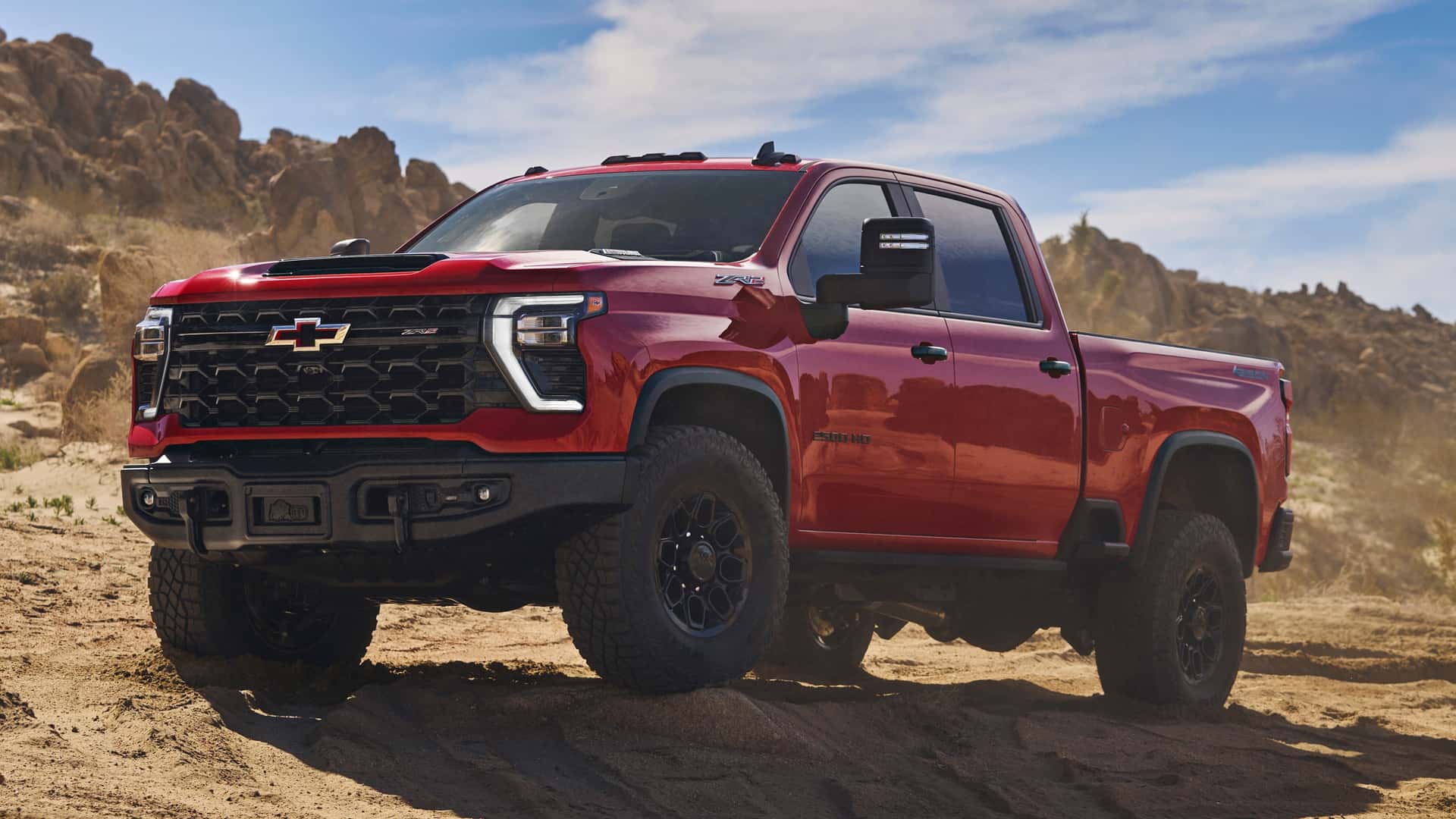Having to share the road with these giant monstrosities sucks. Half or more don’t even use the truck for its intended utility
Half feels generous.
I’ve rented trucks and vans the few times I’ve needed one. And I can drive a way smaller car in the meantime. Best of both worlds.
As a compensator I’d say it’s being used exactly as the intended use.
What a shit show. Nothing but bullshit, second guessing, and mistiming from GM. Ultium is proving to be a disaster, Bolt program was great but they ruined that, they killed the volt and other hybrids but now want to bring back hybrids as if a random piecemeal strategy for power train development is remotely practical, all while focusing on big ass dangerous vehicles exclusively. As much as I’d love to buy a union made homegrown EV their portfolio is just awful. Godspeed Mary.
Well, the strategy is to electrify their highest-margin vehicles and try to charge a premium for them. I think its a reasonable strategy… but…
they killed the volt and other hybrids
Yeah, this is the key problem. GM is killing their own momentum, while Toyota’s redesigned Prius 2024 / RAV4 lineup is extremely competitive, Ford with the Hybrid Maverick and Hybrid F150, and finally F150 Lightning.
All these GM vehicles are arriving years late. Its going to be an uphill battle. But I’m glad that GM is at least trying to move in now.
The good news for PHEV fans is that there’s Prius Prime, RAV4 Prime, Ford Escape PHEV, Lincoln Corsair PHEV, Kia Niro PHEV, Hyundai Tucson PHEV just off the top of my head. We don’t need GM vehicles per se, though as you note… it’d be nice to have a US union-made GM as part of this market. (I think the Ford and Lincoln models are US-made and union made btw)
The problem is that it was a decent strategy. When practical BEVs were new and exciting, and you have all the excitement around startups and new technologies, the strategy of starting with high priced, high profit models worked. There were enough early adopters and market excitement. Now there are options, and GM hasn’t been the center of excitement in a century, so who’s going to buy high priced, high margin stuff from them? They missed that winDow of opportunity, and really need to iterate on the Bolt/Volt legacy they started. Their opportunity now is their bread and butter: making practical, affordable cars for everyone
There’s still unexplored niches that GM can capture. Silverado and GMC Sierra are likely going to be the first PHEV pickup.
The market is beginning to get crowded at the practical, affordable car range. Prius Prime is a very solid car for the compact car segment, and RAV4 Prime in the CUV segment is also solid. Even then, there’s Hyundai Tucson PHEV and Kia Niro. Ford Escape PHEV is being killed off (damn it Ford), but the low-end PHEV segment is basically saturated as it is. Its probably a good idea for GM to have left it, there’s just too much competition now. And that competition is Toyota.
Moving away from Toyota-covered niches is probably a good business move. Even if it means giving up the “practical driver”. There’s just too many “practical drivers” who instinctively buy Toyota these days…
If Ultium is as modular as they want us to believe, then hopefully it’s easy for them to slap in varying levels of PHEV without much headache, right?
It’s weird that PHEVs are just now taking off when BEVs are becoming more viable.
They’re the perfect stepping stone for those who are curious, but afraid to make the leap.
deleted by creator
Hybrids have all the maintenance cost of ICE vehicles and twice as many drivetrain components to break. The extra cost to keep a hybrid on the road easily cancels out the gas savings.
Buy an EV and you have a simple drive train that will rarely break and has no maintenance.
Hybrids have all the maintenance cost of ICE vehicles and twice as many drivetrain components to break. The extra cost to keep a hybrid on the road easily cancels out the gas savings.
Except not.
Prius is one of the most reliable vehicles of the past 20 years with the lowest total-cost-of-ownership. Literally one of the best and most reliable vehicles ever made.
Seriously, look at the stats before echoing bullshit that over-zealous EV fans have told themselves. The least reliable component in all of these vehicles is the battery pack, always has been.
I’ve worked as an automotive technician for about 20 years and 8 of them were as a Toyota tech. The Prius was not a reliable vehicle.
How could the Prius possibly have a lower total-cost-of-ownership than an EV? That statement wreaks of bs. EVs don’t leak engine oil or transmission fluid or coolant or need spark plugs or timing belts or fuel filters or air filters or transmission filters and on and on… or even gas.
Regular maintenance on ICE cars is relatively low. The fluids, belts, and filters are fairly cheap and should be sparsely-needed throughout the normal lifespan of a car. The high number of Prius you saw in the shop is merely due to the popularity of the car (most go over 200k miles and many last 250k-300k). Its counterintuitive. If they weren’t dependable, you wouldn’t see them getting maintained (because they would be in a scrapyard).
Relatively low compared to what? Because we are comparing them to EVs which dont need any of the fluids, filtersseals, gaskets or belts that gas engines need or transmissions or differentials for that matter.
You’re comparing spending money on maintenance to not spending money on maintenance and saying the cost is low. Wtf?
I’m not saying Prius is unreliable because of my personal experience. I’m saying it because of all the common failures that it has documented on a site called Identifix, a site mechanics use to track pattern failures on vehicles.
I gotcha. I absolutely agree EVs should have a lower maintenance cost vs. ICE and hybrids. I’m kinda off-topic (if you are just focusing on maintenace costs).
The real costs-of-ownership working against EV’s are high depreciation and battery failures (very rare). I’d like to see comparisons between how often conventional motors and transmissions fail vs. EV battery failures. Those are the big, worst-case repairs for each and I don’t think we have enough EV data quite yet.
Again, I totally agree with ya that EV maintenance is lower without all the normal ICE fluids and filters. Tires are the only consumables EVs eat more of (when compared to similarly-sized, lighter gas vehicles). Shocks, sway bar links, brakes, tie-rods, etc. all seem approximately equal across the board.
EVs still have fluids and they really ought to be changed. Shit some really bad ones still have belts. Your battery pack still has coolant, and differentials are still differentials they’ve still got oil. Just because Toyota says the fluid is “life time” doesn’t mean it actually lasts a life time.
Hybrids shift all of the hard work to the dead simple electric motors, and allow the gas engines to stay in their happy zone. There’s a reason why priuses and other hybrids are know to be stupid reliable. Maintenance is also a lot less frequent because of that. So while you technically have to do it, you go MUCH longer in between doing them. I’d be comfortable doing 15k mile oil changes on a hybrid, but not on a gas car.
Granted this is GM so I’d expect them to fuck something up about these cars. But it’s their trucks and those are like the only good things GM makes.
There are several different configurations of hybrids so most of them don’t drive the wheels with only the electric motor. Most of them operate just like a gas car with twice as many parts to break by assisting the gas engine with the electric motor for a short range.
Gaskets and seals and spark plugs and air filters and fuel filters and all the maintenance items and fluid changes are often recommend based off time/mileage whichever comes first. So while you may not be adding up the miles as fast, the times between service is the same.
It doesn’t matter if it’s a parallel or series hybrid. The electric motor does the most work in stop and go traffic, and thats what also hurts your engine the most. The electric motor allows the gas engine to not have to stress itself as much, and run in much more optimal load ranges.
Gaskets and seals almost never have change intervals, it’s replace them when they leak. Air filters are $30 and take 10 minutes to change so the labor rate is stupid cheap for those. Synthetic oil changes aren’t that expensive, and last a lot longer than most people think. Many German (regular gas) cars suggest 1-2 year and 10-15k mile intervals for their oil changes, and even dealers will do those for under $100. In 5 years I’ve spent less than $1500 in maintenance on my regular ass gas Outback, and that’s doing work way ahead of schedule, not waiting until Subarus prescribed times. Maintenance costs are not that big of a concern for new gas cars.
What holds people back from EVs is range anxiety. A phev gives them exactly what they want.
I get the range anxiety problem and I’m all for burning less fossil fuels, but the cost to own a hybrid is as much as an ICE and an EV combined. People are better off getting an EV with enough range to drive around town (which isn’t much) and using charging stations if they roadtrip. At least that’s the best choice cost wise.
Are there many charging stations built for trucks that are towing something?
From my experience with a Rav4 PHEV, no. That said if I could get a sierra to run on battery for quick trips around town, but also tow our family camper on gas or diesel throughout the summer I would buy one tomorrow.
To be honest you run into issues with gas stations, too, and often need to look for the right one.
Yep, it’s the same resistance to change, just delayed a bit. For all this time, no one wants to buy hybrid, especially plug-in hybrid, they’re too complicated and expensive, Toyota must be taking a loss on every one, they’ll never fly in the US. Now that market focus has moved on, BEVs are compelling and desirable, there’s that looking back to the last new thing, rather than figure out the new thing
Not what we want. Small, cheap, reliable EV. Yesterday.
Please I just want a small affordable economical EV with 150 miles of range for every day practical use.
Nissan leaf






